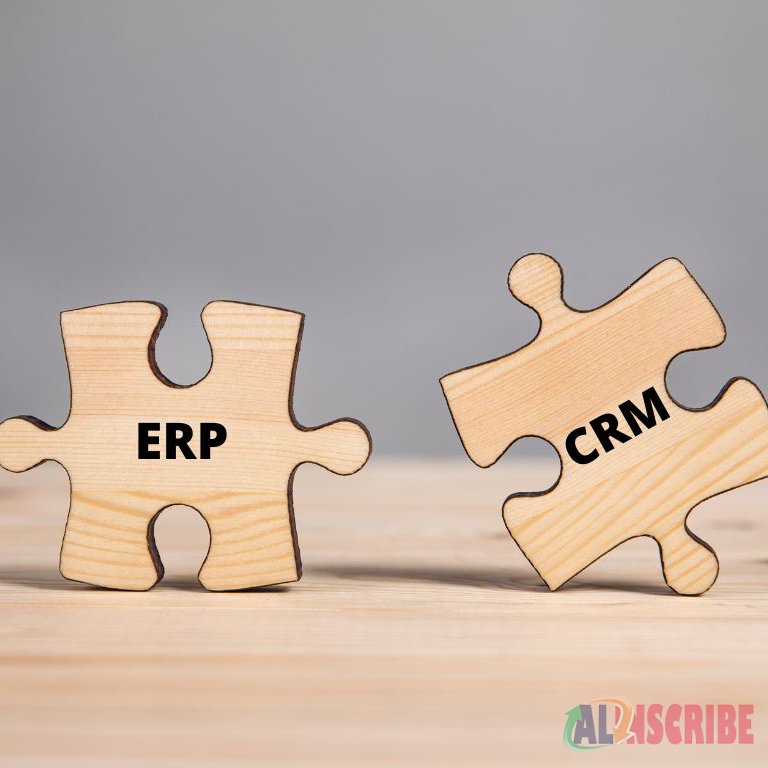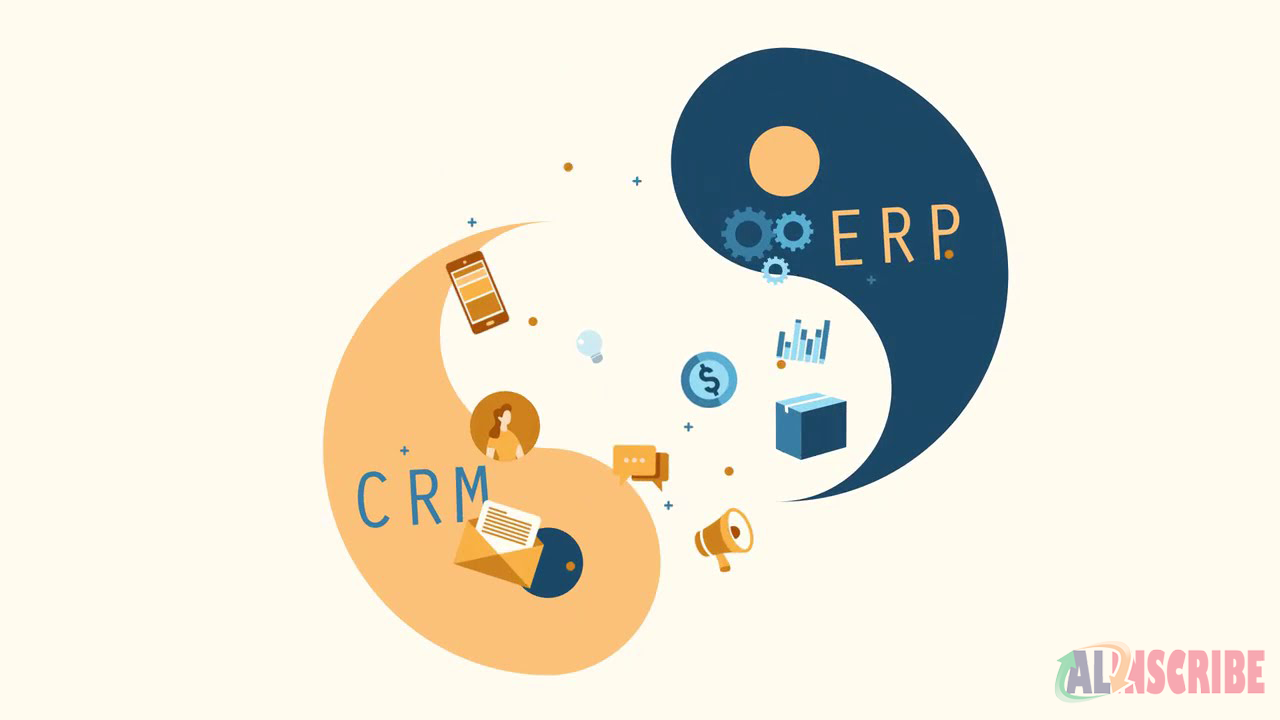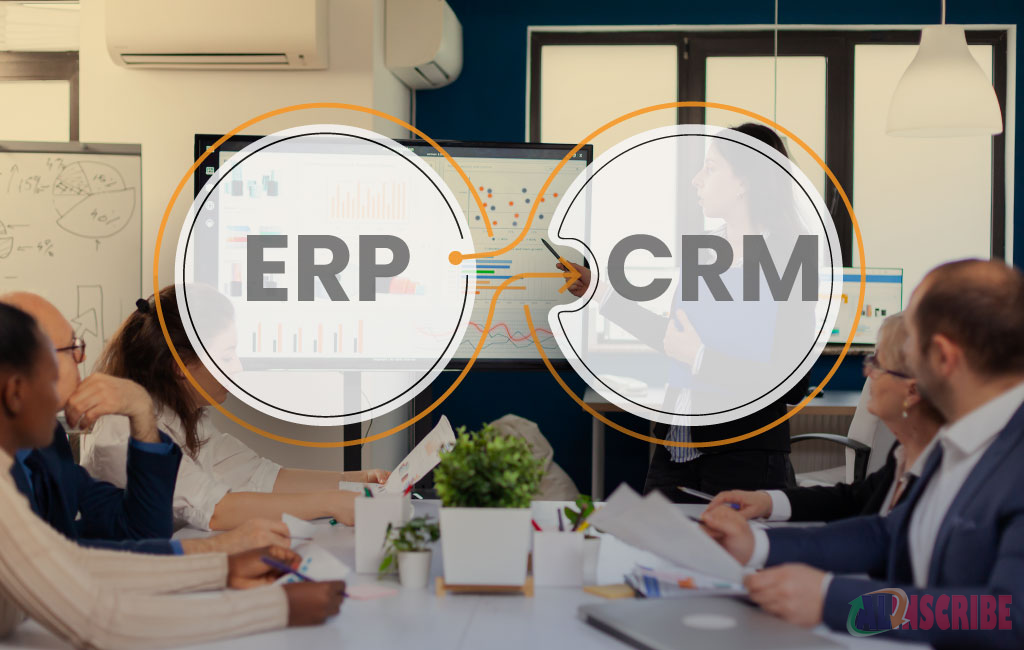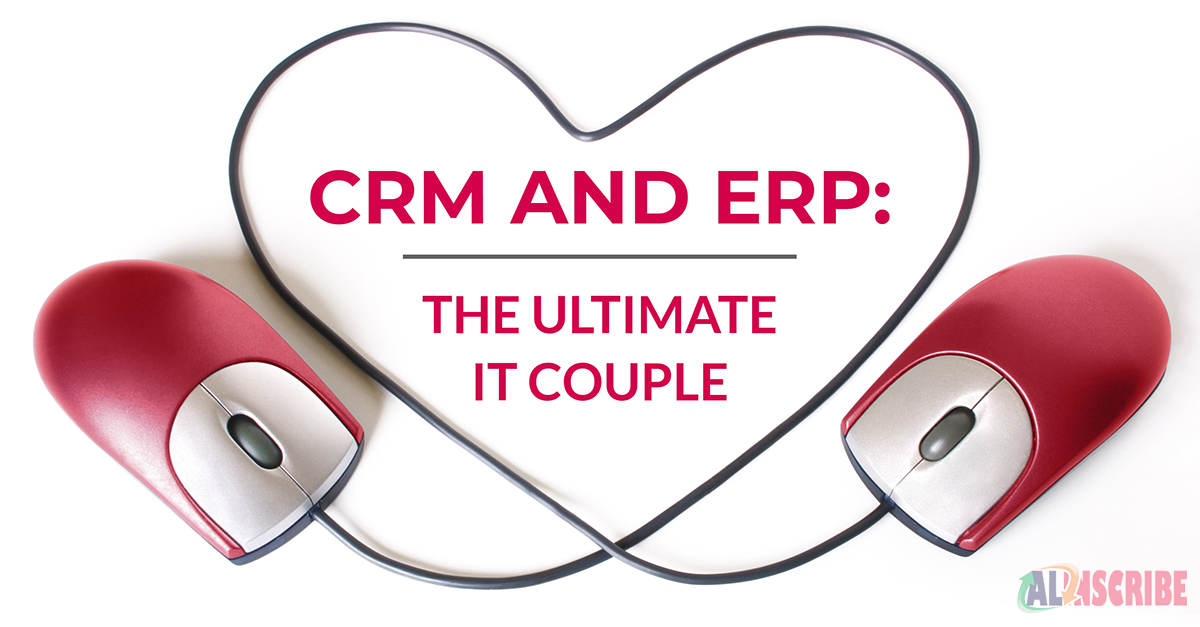Why Should ERP And CRM Systems Work Together

Digitization of companies depend mostly on the tools that are used for transforming business processes effectively. ERP and CRM systems can be considered as two of the most important driving forces of digital transformation. Implementing both of these systems are crucial for establishing better efficiency and scalability within an organization.
These two systems certainly do a great job individually, but these work even better when these work together. So many of your business processes are integrated and promotes a smoother workflow to enhance the overall performance of your company.
In this article, we are going to discuss the reasons why ERP CRM systems should work together along with some brief descriptions, benefits, challenges and strategies that are associated with this topic.
How does an ERP system work?
An ERP (Enterprise Resource Planning) system plans, schedules, and store important data related to your business. It works with a centralized database that connects and integrated all or most of your business processes together. With the help of an ERP system, you can automate your day-today activities and eliminate errors and rigidness from it all.
How does a CRM system work?
A CRM (Customer Relationship Management) system manages customer data, communication, queries and so on. It helps in connecting your company with your customers in a more integrated manner. CRM systems enhances the security of customers’ contact details, purchase history, payment details and more. Thus, implementing a CRM system is certainly beneficial for your company and its reputation among your customers.
How can ERP CRM systems work together?
ERP CRM systems can be integrated with each other and work as a unified platform to support every need associated with a business. Most of the ERP systems have in-built CRM module to store all customer related data and communication within it. Integrating ERP CRM systems together can save time as the systems will be able to transfer data between one another without leaving any room for any error.
Additionally, you can gain a plethora of benefits by making ERP CRM systems work together as a unified platform. The next section of the article explains some of the benefits that can be claimed by integrating ERP CRM systems together.

Benefits of ERP CRM systems working together
Comprehensive Data Management
One of the key advantages of integrating ERP CRM systems is the ability to create a comprehensive and centralized data repository. While ERPs focus on internal operations, such as finance, procurement, and inventory management, CRMs specialize in managing customer interactions and sales. When integrated, these systems share vital data, such as customer information, sales orders, and product availability. This results in a single source of truth for all stakeholders, enabling informed decision-making and enhanced efficiency.
Enhanced Customer Insights
CRM systems are designed to provide a 360-degree view of customer interactions. When combined with ERP data, this customer information becomes even more valuable. Integrated systems can offer insights into customer preferences, purchase history, credit limits, and more. These ERP CRM systems insights empower sales and customer service teams to better understand individual customer needs and tailor their approach, fostering stronger and more profitable customer relationships.
Improved Order Fulfillment
ERP systems are pivotal in managing the supply chain and order fulfillment processes. Integrating the CRM system with the ERP enables sales and customer service teams to check real-time inventory levels, lead times, and production schedules, allowing them to provide customers with accurate delivery dates and product availability information. This transparency powered by ERP CRM systems is key to ensuring that customer orders are fulfilled promptly and accurately, leading to higher customer satisfaction and loyalty.
Streamlined Sales and Marketing
Marketing and sales teams rely on CRM systems to track leads, opportunities, and customer interactions. By linking CRM data with ERP information, businesses can gain a better understanding of the entire sales process, from lead generation to order completion. This ERP CRM systems integration helps identify which marketing efforts generate the most revenue and which products have the highest sales potential. In turn, this information allows for more focused marketing campaigns and improved sales strategies.
Efficient Financial Management
A significant benefit of integrating ERP CRM systems is enhanced financial management. ERP systems track financial data, including invoices, purchase orders, and financial statements. When tied to CRM systems, businesses can seamlessly generate quotes and invoices, link them to sales orders, and monitor payment status. This integration streamlines the financial processes, reduces the risk of errors, and provides a real-time overview of the company's financial health.
Data Accuracy and Reduction in Errors
Manual data entry and data duplication are common sources of errors in business processes. Integrating ERP CRM systems significantly reduces these issues. When data is entered into one system, it is automatically updated in the other, eliminating the need for double data entry. This not only saves time but also ensures that data remains accurate and consistent across the organization.
Scalability and Growth
As businesses grow, the need for efficient data management becomes more critical. ERP CRM systems are designed to scale with your organization, making them invaluable tools for long-term growth. By working together, these systems provide the foundation for a robust and adaptable infrastructure that can accommodate increased data volume, user demands, and new business processes.

Challenges of ERP CRM system integration
Just as benefits there are some of the inevitable challenges that you are bound to face when you make ERP CRM systems work together. These challenges and the methods of overcoming the same are presented below,
Data Mapping and Synchronization
One of the primary technical challenges in ERP CRM system integration is data mapping and synchronization. ERP CRM systems often use different data structures, formats, and naming conventions. This can lead to data inconsistency, duplication, or data loss during the integration process. To overcome this challenge, organizations should invest in data transformation tools and establish clear data mapping rules. Additionally, regular data cleansing and validation processes can help maintain data quality.
Integration of Customization
ERP CRM systems are typically tailored to the specific needs of an organization. Customization can involve adding new fields, workflows, or modules. When integrating these customized systems, conflicts may arise due to differences in customization strategies. To address this, businesses should document their customizations thoroughly and collaborate closely with vendors or developers to ensure that custom components can be seamlessly integrated.
Integration Costs
The cost of ERP CRM system integration can be significant, primarily because it involves specialized software, skilled personnel, and potential system upgrades. Businesses often underestimate the financial requirements and may encounter unexpected expenses during the integration process. To mitigate this challenge, organizations should conduct a thorough cost-benefit analysis and establish a realistic budget. They should also consider the long-term benefits, such as improved productivity and data-driven decision-making, to justify the costs.
Compatibility Issues
ERP and CRM systems are built on different technologies and platforms. Ensuring compatibility between these systems can be challenging, especially when upgrading or patching one system may disrupt the integration. Businesses should work closely with their software vendors and IT teams to ensure that the ERP CRM systems are compatible with each other and any planned updates.
Scalability and Performance
As businesses grow, their data volumes and user demands increase. Integrating ERP CRM systems that can't scale effectively can lead to performance issues and system slowdowns. To tackle this challenge, organizations should select scalable solutions from the start, regularly monitor system performance, and consider cloud-based solutions that offer flexibility and scalability on-demand.
Security and Data Privacy
Data security and privacy are paramount concerns when integrating ERP CRM systems, as these systems often contain sensitive business and customer data. Maintaining a high level of security and compliance during integration is essential. Implementing encryption, access controls, and regular security audits can help safeguard the integrated environment.
User Training and Change Management
Users must adapt to the changes brought about by the integration of ERP CRM systems. Training employees to use the integrated system effectively is a significant technical challenge. Organizations should develop comprehensive training programs and provide ongoing support to ensure a smooth transition. Additionally, change management strategies can help employees embrace the new system and minimize disruptions.
ERP CRM systems integration strategies
Integrating ERP CRM systems are, without a doubt, quite tough task to complete. Especially, when you run a large company or an organization, then it is particularly tough to integrate the systems together while eliminating the need to duplicating data. In this regard, you require the help of some strategies. Some of the most helpful strategies are discussed below,
Define Clear Objectives
Start by clearly defining your integration objectives. Determine what specific data and processes need to be shared between the ERP CRM systems. Understanding your goals is crucial for a successful integration.
Select the Right Systems
Ensure that the ERP CRM systems you choose are compatible and have built-in integration capabilities or can be integrated using third-party tools. Popular ERP systems like SAP, Oracle, or Microsoft Dynamics and CRM systems like Salesforce, HubSpot, or Zoho often have integration options.

Data Mapping and Cleanup
Align data structures between the ERP and CRM systems. Create a data map that defines how data will be transferred, what fields correspond to each other, and what transformations are needed. Ensure data quality by cleaning and normalizing data before integration.
Integration Middleware
Use middleware or integration platforms like MuleSoft, Boomi, or Zapier to facilitate data transfer between ERP and CRM systems. These tools provide pre-built connectors and help automate the integration process.
Real-Time vs. Batch Integration
Decide whether you need real-time or batch integration. Real-time integration ensures data is immediately synchronized, while batch integration may be sufficient for less time-sensitive data. Your choice depends on business requirements.
Security and Compliance
Implement robust security measures to protect sensitive data during integration. Ensure that you comply with relevant regulations, such as GDPR, HIPAA, or industry-specific standards.
Testing and Validation
Thoroughly test the integration process to identify and resolve any issues before going live. Perform unit testing, integration testing, and user acceptance testing to ensure data accuracy and system stability.
User Training and Support
Train users who will be working with the integrated systems. Provide documentation and support to help them understand the new workflow and processes resulting from the integration.
Scalability and Future-Proofing
Consider the future growth of your business and how the integration will scale. Choose systems and integration methods that can adapt to evolving needs and technologies.
Monitoring and Maintenance
Continuously monitor the integration for errors, data discrepancies, and performance issues. Have a maintenance plan in place to address updates, patches, and changes to the ERP or CRM systems.
Change Management
Implement a change management strategy to ensure that employees are comfortable with the new integrated systems and processes. Address resistance to change and provide ongoing support.
KPIs and Performance Metrics
Define key performance indicators (KPIs) to measure the success of your ERP-CRM integration. Regularly assess the impact on productivity, customer satisfaction, and other relevant metrics.
Executive Sponsorship
Secure support from key executives within your organization to ensure the integration project gets the necessary resources and attention.
Documentation and Knowledge Sharing
Maintain comprehensive documentation of the integration process and share knowledge with relevant teams to ensure that the integration remains a well-understood and supported aspect of your business.
Continuous Improvement
Seek feedback from users and stakeholders and use it to make continuous improvements to the integration. Technology evolves, and so should your integration strategy.
ERP CRM integration can significantly enhance efficiency, customer service, and decision-making within an organization. However, it requires careful planning, execution, and ongoing management to be successful.
5 software to offer both ERP and CRM features
Many businesses are seeking integrated solutions that combine Enterprise Resource Planning (ERP) and Customer Relationship Management (CRM) functionalities into a single platform. This convergence offers a holistic view of operations and customer interactions, leading to improved efficiency, better decision-making, and enhanced customer satisfaction. Here are five of the best ERP & CRM software platforms that offer both features:
1. Microsoft Dynamics 365
Microsoft Dynamics 365 is a comprehensive suite of cloud-based business applications that seamlessly integrate ERP and CRM functionalities. It's designed to provide a 360-degree view of a business, encompassing finance, operations, sales, customer service, and marketing. Dynamics 365 offers a modular approach, allowing businesses to select and deploy specific applications based on their needs. For ERP, it provides robust financial management, supply chain management, project operations, and manufacturing capabilities, helping businesses optimize their back-office processes. On the CRM front, it empowers sales teams with lead management, opportunity tracking, sales forecasting, and customer insights.
Customer service modules streamline support processes, while marketing automation tools facilitate targeted campaigns. The platform's tight integration with other Microsoft products like Office 365 and Power BI enhances collaboration, data analysis, and reporting, making it a powerful choice for businesses looking for a unified solution that can scale with their growth. Its flexibility and extensive ecosystem make it suitable for a wide range of industries and business sizes, from small to large enterprises.
2. Oracle NetSuite
Oracle NetSuite is a leading cloud-based business management software suite that provides a comprehensive set of ERP, CRM, and e-commerce functionalities in a single, unified platform. For ERP, NetSuite offers robust capabilities in financial management, global business management, inventory management, order management, and supply chain. This helps businesses streamline their core operational processes, automate tasks, and gain real-time visibility into their financial health. On the CRM side, NetSuite delivers strong sales force automation, customer service management, marketing automation, and partner relationship management features. This enables businesses to manage the entire customer lifecycle, from lead generation and sales to customer support and retention.
The platform's unified database eliminates data silos, providing a single source of truth for both customer and operational data. This allows for better alignment between sales, marketing, and service teams with back-office operations, leading to improved customer experiences and operational efficiency. NetSuite is particularly well-suited for fast-growing businesses and those looking for a scalable solution in the cloud, offering extensive customization options and a broad ecosystem of third-party integrations.
3. SAP ERP (with CRM modules)
While SAP is historically known for its strong ERP capabilities, particularly with solutions like SAP S/4HANA, it also offers comprehensive CRM functionalities that are either embedded within its ERP suite or seamlessly integrated. SAP's ERP solutions provide robust modules for financial accounting, controlling, production planning, materials management, and human capital management, enabling businesses to manage their core operations efficiently. For CRM, SAP offers modules for sales, service, marketing, and commerce, providing a 360-degree view of the customer. This integration allows for a seamless flow of information between front-office customer interactions and back-office operations, such as order fulfillment, billing, and inventory management. For instance, sales orders created in the CRM can directly trigger production or procurement processes in the ERP. This unified approach helps businesses optimize their customer engagement strategies while ensuring operational excellence. SAP's strength lies in its ability to handle complex business processes and large volumes of data, making it a preferred choice for large enterprises and global organizations across various industries. Its continued investment in cloud and AI technologies further enhances its integrated ERP-CRM offerings.
4. Odoo
Odoo is a unique open-source suite of business management software that offers a vast array of applications, including robust ERP and CRM functionalities, all integrated into a single, modular platform. Odoo's ERP capabilities cover accounting, inventory, manufacturing, purchasing, project management, and human resources, providing a comprehensive solution for managing back-office operations. Its CRM module offers tools for lead management, sales pipeline tracking, customer communication, and reporting, enabling businesses to effectively manage their customer relationships. What sets Odoo apart is its open-source nature, which allows for extensive customization and flexibility to adapt to specific business needs.
Users can choose from a wide range of official and community-developed applications to build a tailored solution. The seamless integration between Odoo's various apps means that data flows effortlessly between sales, inventory, accounting, and other departments, eliminating manual data entry and reducing errors. This unified approach provides real-time insights into both customer interactions and operational performance, making Odoo an attractive option for businesses of all sizes, especially small to medium-sized enterprises (SMEs) looking for an affordable yet powerful all-in-one solution.
5. Acumatica
Acumatica is a cloud ERP software designed for mid-sized businesses, known for its flexibility and comprehensive suite of business applications that naturally include both ERP and CRM features. Its core strength lies in its adaptability and ability to scale, offering strong financial management, distribution management, manufacturing management, and project accounting functionalities. This provides a robust foundation for managing all back-office operations and ensuring efficient resource planning.
On the CRM side, Acumatica delivers tools for sales automation, marketing automation, and customer support, enabling businesses to manage the entire customer lifecycle from lead to cash. The integrated platform ensures that sales and customer service teams have immediate access to critical ERP data, such as inventory levels, order status, and billing information, allowing for more informed interactions and improved customer satisfaction. Acumatica stands out for its user-friendly interface, powerful reporting and analytics capabilities, and its unique pricing model (based on resources consumed, not users), which can be particularly beneficial for growing companies. Its commitment to providing a single, unified view of the business empowers organizations to make data-driven decisions and enhance overall operational efficiency and customer engagement.
Conclusion
The article can be concluded by stating that ERP CRM systems are certainly meant to work together. The working capabilities of both of the systems can double up when they are integrated with each other. However, there are some of the challenges that are bound to be faced by you while working with these integrated platforms. Overcoming these challenges and gaining most of the benefits are what should be aimed at.
Article Comments
Similar Articles
Articles Search
Sponsor
There are zero sub-categories in this parent category.
There are zero sub-categories in this parent category.
There are zero sub-categories in this parent category.
















